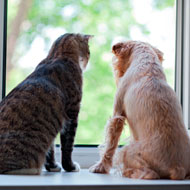
AVMA issues advice to US vets
US officials say there have been no reported cases of dogs or cats becoming sick with Ebola, even in parts of Africa where the virus is present. It is not yet known whether pets can spread the virus.
Recently, Spanish health authorities made the decision to euthanise a dog belonging to a healthcare worker exposed to Ebola. Coupled with the death of a traveller diagnosed with Ebola in the US, the case has raised questions among veterinary surgeons and clients.
In response, the American Veterinary Medical Foundation (AVMA) is developing guidance with the Centers for Disease Control and Prevention, the US Department of Agriculture and other agencies.
The case in Spain has raised questions over whether pets are actually capable of spreading Ebola. While there have been no reported cases of cats and dogs spreading the virus, it is not known for sure whether it can be spread to humans or other animals.
Only a few mammal species are known to be capable of spreading the virus - it can be caught by handling or consuming wild fruit bats and non-human primates. Mosquitoes and other insects are not thought to be able to transmit Ebola.
Ebola is spread through direct contact with bodily fluids or contaminated objects such as syringes. Symptomatic individuals should avoid contact with people and animals. AVMA says the chance of a US dog becoming exposed to Ebola is very low.
For more guidance on Ebola and pets visit the AVMA website: www.avma.org



 The latest
The latest